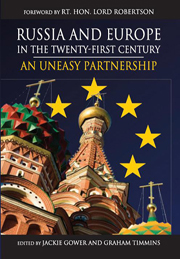Book contents
- Frontmatter
- Contents
- List of Contributors
- Acknowledgements
- List of Abbreviations/Acronyms
- Foreword Russia and Europe
- Preface
- Introduction Russia and Europe: What Kind of Partnership?
- PART 1 Russia looking West
- Chapter 1 Vladimir Putin and Russian Foreign Policy towards the West: Towards a New Realism
- Chapter 2 The ‘Normalization’ of Russian Politics and Europe
- Chapter 3 The Russian Elite Perspective on European Relations
- Chapter 4 Domestic Politics and Foreign Policy Formulation
- Chapter 5 Russia's Regions in Shaping National Foreign Policy
- Chapter 6 The Russian Military and European Security Cooperation
- PART 2 Europe looking East
- PART 3 Partnership in Practice
- Conclusion Russia and Europe: An Uneasy Partnership 289
- Index
- More Titles in this series
Chapter 3 - The Russian Elite Perspective on European Relations
from PART 1 - Russia looking West
Published online by Cambridge University Press: 05 March 2012
- Frontmatter
- Contents
- List of Contributors
- Acknowledgements
- List of Abbreviations/Acronyms
- Foreword Russia and Europe
- Preface
- Introduction Russia and Europe: What Kind of Partnership?
- PART 1 Russia looking West
- Chapter 1 Vladimir Putin and Russian Foreign Policy towards the West: Towards a New Realism
- Chapter 2 The ‘Normalization’ of Russian Politics and Europe
- Chapter 3 The Russian Elite Perspective on European Relations
- Chapter 4 Domestic Politics and Foreign Policy Formulation
- Chapter 5 Russia's Regions in Shaping National Foreign Policy
- Chapter 6 The Russian Military and European Security Cooperation
- PART 2 Europe looking East
- PART 3 Partnership in Practice
- Conclusion Russia and Europe: An Uneasy Partnership 289
- Index
- More Titles in this series
Summary
Introduction
When the long-projected enlargement of the European Union (EU) finally took place on 1 May 2004, the Western Newly Independent States (WNIS), as the European Commission calls the former Soviet states of Belarus, Moldova, Russia and Ukraine, became the EU's new eastern neighbourhood. Although they had no prospect of acceding to the EU in the foreseeable future, they were perceived as ‘the EU's essential partners’. Indeed, the attainment of security, stability and sustainable development within the Union was deemed to require political reform, social cohesion and economic dynamism outside it, in particular in the EU's new eastern neighbourhood. The European Commission proposed a European Neighbourhood programme to promote a set of values ‘within the fields of the rule of law, good governance, the respect for human rights, including minority rights, the promotion of good neighbourly relations, and the principles of market economy and sustainable development’.
Russians were appalled that the EU's new neighbourhood plans appeared to put Russia in the same category not only as Belarus and Moldova, but also as the states of North Africa. Russia was duly left out of the European Neighbourhood Policy (ENP); instead the EU and Russia decided to develop their strategic partnership through the creation of four common spaces. However, the EU-Russian strategic partnership was already experiencing considerable strain by this time. Following the December 2003 parliamentary election, the Duma was dominated by the pro-presidential United Russia party, with little or no representation of those parties, Yabloko and the Union of Right Forces, which had previously been the most enthusiastic supporters of relations with the EU and of a ‘European perspective’ more generally.
- Type
- Chapter
- Information
- Russia and Europe in the Twenty-First CenturyAn Uneasy Partnership, pp. 41 - 56Publisher: Anthem PressPrint publication year: 2007



